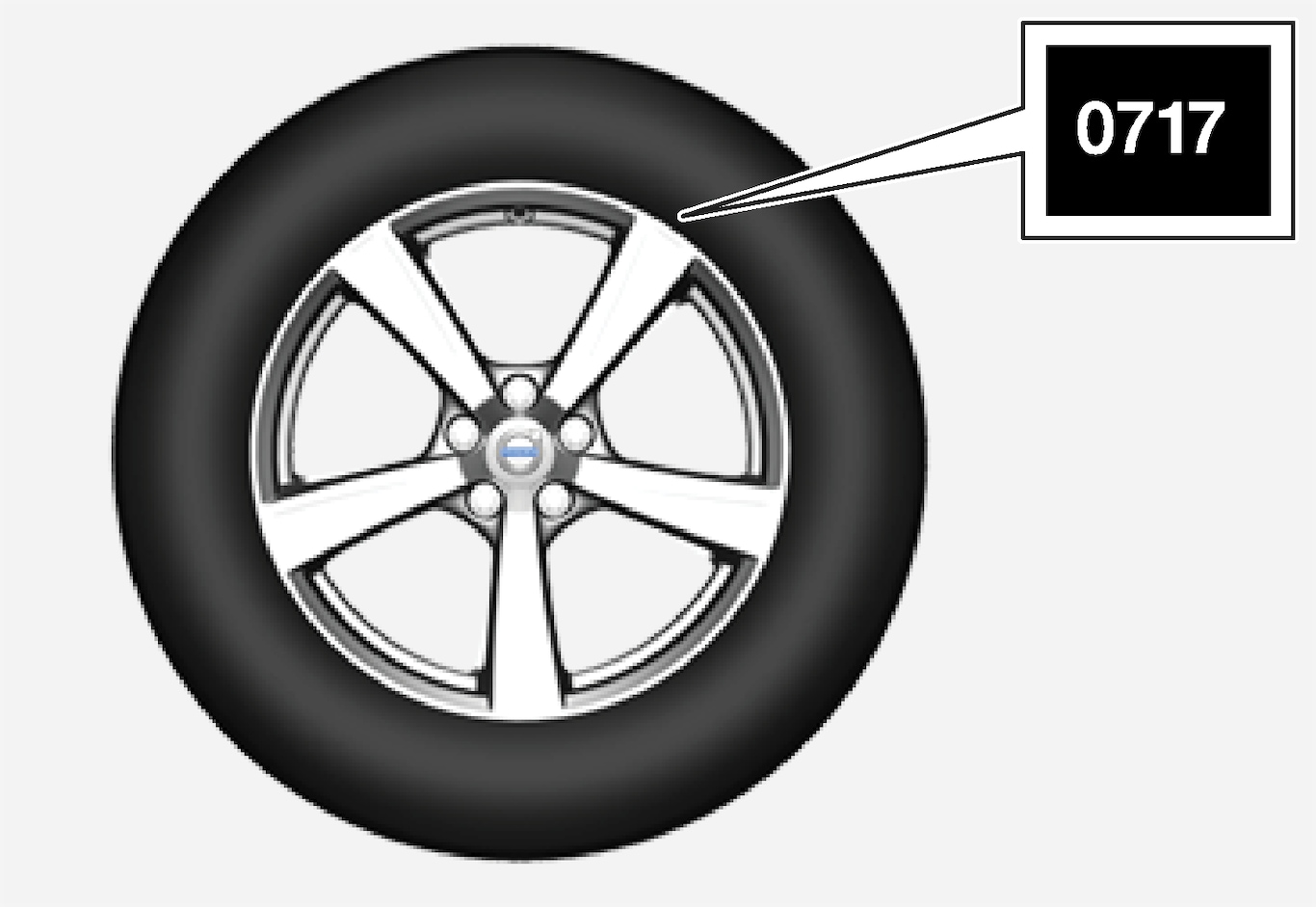The tyres greatly affect the car's driving characteristics. The type of tyre, dimensions, tyre pressure and speed rating are important for how the car performs.
The car is fitted with tyres according to the tyre information sticker found on the driver's side door pillar (between the front door and the rear door).
Warning
Recommended tyres
On delivery, the car is equipped with Volvo original tyres that have the VOL1 marking on the side of the tyres. These tyres are carefully adapted to the car. In the event of changing tyres, it is therefore important that the new tyres also have this marking in order for the car's driving characteristics, comfort and energy consumption to be maintained.
New tyres

Tyres are perishable. After a few years they begin to harden at the same time as the friction capacity/characteristics gradually deteriorate. For this reason, aim to get as fresh tyres as possible when you replace them. This is especially important with regard to winter tyres. The last four digits in the sequence mean the week and year of manufacture. This is the tyre's DOT marking (Department of Transportation), and this is stated with four digits, for example 0717. The tyre is then manufactured in week 07, year 2017.
Tyre age
All tyres older than 6 years old should be checked by an expert even if they seem undamaged. Tyres age and decompose, even if they are hardly ever or never used. The function can therefore be affected. This applies to all tyres that are stored for future use. Examples of external signs which indicate that the tyre is unsuitable for use are cracks or discolouration.
Tyre economy
- Maintain the correct tyre pressure.
- Avoid fast starts, heavy braking and squealing tyres.
- Tyre wear increases with speed.
- Correct wheel alignment is very important.
- Unbalanced wheels worsen tyre economy and travelling comfort.
- The tyres should rotate in the same direction during their entire service life.
- When you change tyres, the tyres with the deepest tyre tread can be fitted on the rear axle in order to reduce the risk of oversteer skidding during aquaplaning, cornering or sudden braking on wet roads.
- If you drive over kerbstones or deep holes you can damage the tyres and/or wheel rims permanently.
- On cars with different front and rear tyre or wheel dimensions, it is not permitted to change position between front and rear wheels.
Tyre rotation
Driving style, tyre pressure, climate and road condition affect how quickly the tyres age and wear. Correct tyre pressure results in more even wear.
To avoid major differences in tread depth, and to prevent wear patterns forming on the tyres, the front and rear wheels can be switched with each other. A suitable distance for the first change is approx. 5000 km (approx. 3100 miles) and then at 10000 km (approx. 6200 miles) intervals.
Volvo recommends the an authorised Volvo workshop is contacted for checking if you are uncertain about tread depth. If significant differences in wear (> 1 mm difference in tread depth) between tyres have already occurred, then the least worn tyres should be fitted on the rear. Understeer skidding is normally easier to correct than oversteer skidding. This is why it is important for the rear wheels not to lose grip before the front wheels.
Important
Storing wheels and tyres
When you store complete wheels (tyres fitted on wheel rims) they should be hung up or positioned lying on their sides on the floor.
Tyres not fitted on rims must be stored lying on their sides or standing upright, but not hung up.
Important
Warning
- Wheel rim size and tyre size for your Volvo are specified to meet stringent requirements for stability and driving characteristics. Unapproved combinations of wheel rim size and tyre size may have a negative effect on the car's stability and driving characteristics.
- Any damage caused by the fitting of unapproved combinations of wheel rim size and tyre size is not covered by the new car warranty. Volvo accepts no liability for death, personal injury or any costs caused by such installations.